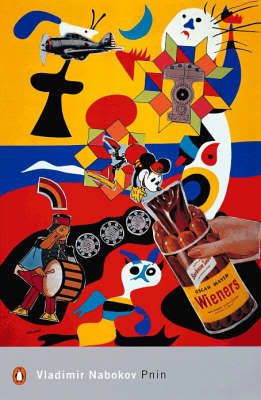
Pnin was published two years after Lolita, in 1957. (Next, in 1962, would come Pale Fire, the only Nabokov I’ve read which comes close to Lolita.) The first question to consider is whether it’s a novel at all. Four chapters of the book - more than half its length - were published as individual stories in The New Yorker, and Nabokov - astonishing to think of it - had trouble placing it with publishers, who considered a mere “collection of sketches”. Nabokov denied this, though was unsure whether he could assert it to be a novel (”I do not know whether it is or not”), settling only on its being “a complete work, whatever label be attached to it.”
That we can agree on. Pnin is a complete work, with unity of character provided by its sympathetic comic protagonist, Professor Timofey Pnin.
He taught Russian at Waindell College, a somewhat provincial institution characterized by an artificial lake in the middle of a landscaped campus, by ivied galleries connecting the various halls [and] by murals displaying the recognisable members of the faculty in the act of passing on the torch of knowledge from Aristotle, Shakespeare and Pasteur to a lot of monstrously built farm boys and girls.Like Nabokov, he has come to America via Russia (”his father, Dr Pavel Pnin, an eye specialist of considerable repute, had once had the honour of treating Leo Tolstoy for a case of conjunctivitis”) and Germany; unlike Nabokov, his English is poor (”if his Russian was music, his English was murder”), and he has a habit of getting into humorous scrapes. Like many Nabokov characters, he is a martyr to insomnia. “He never attempted to sleep on his left side, even in those dismal hours of the night when the insomniac longs for a third side after trying to the two he has.”
We are treated to episodes in the life of Pnin and those around him, in which Pnin appears well-meaning but misled, intuitive but confused, trying to fit in to the American way of life.
In the beginning Pnin was greatly embarrassed by the ease with which first names were bandied about in America: after a single party, with an iceberg in a drop of whisky to start and with a lot of whisky in a little tap water to finish, you were supposed to call a grey-templed stranger ‘Jim’, while he called you ‘Tim’ for ever and ever. If you forgot and called him the next morning Professor Everett (his real name to you) it was (for him) a terrible insult.In the course of these vignettes, Pnin takes the wrong train and rents a room in a colleague’s home, and encounters his ex-wife (whose son’s story provides one of the most satisfying chapters). It is clever, funny, elegantly Nabokovian and beautifully written (with plenty of Nabokov’s speciality of what we might call portmanteau sentences, packing more in than should really be possible). At the same time I wondered if that was all there was to it. I needn’t have worried. Like Lolita and Pale Fire, Pnin turns out to be as much about its narrator as about its subject. An early clue comes when one of the beautifully written sentences is so ‘beautifully written’ that it’s downright ugly:
An elliptical flock of pigeons, in circular volitation, soaring grey, flapping white, then grey again, wheeled across the limpid, pale sky, above the College Library.Surely Nabokov would never stoop to such lazy ornamentation? Then we notice times when the ostensibly omniscient narrative pauses to offer opinions on characters (”…Dr Eric Wind, a completely humourless pedant…”) and that the word I crops up more and more often.
This turns the narrative on its head. The book is still about the same things - belonging, fitting in - but now from a different viewpoint, with more hostility than hospitality. The narrator - who comes into full view in the last chapter - bears certain similarities to our author. The reader is left to determine what reliance can be placed on his portrait of Pnin, and to tussle with the usual problems of a narrator with a vested interest. We must accept some of what he says, otherwise we are playing tennis without a net. But is it brilliance or convenience when Nabokov - known for his coolness of style, of lording it over his people (”My characters are galley slaves”) - creates a narrator who coolly lords it over his people? Or when we trust that the overwrought prose was consciously so, and not attributed thus after the event? In the end it is a question of trust, and we give the benefit of the doubt to those writers in whom we have faith. Nabokov for me is still one of those. The author remains reliable, even when the narrator is not.